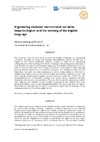Please use this identifier to cite or link to this item:
https://accedacris.ulpgc.es/jspui/handle/10553/70362
| Title: | Engineering students’ motivational variables towards English and the learning of the English language | Other Titles: | Variables motivacionales de los estudiantes de ingeniería hacia el inglés y el aprendizaje del idioma inglés | Authors: | Amengual-Pizarro, Marian | UNESCO Clasification: | 570107 Lengua y literatura 550510 Filología |
Keywords: | L2 motivation Attitudes L2anxiety Linguistic self-confidence ESP students, et al |
Issue Date: | 2017 | Journal: | LFE. Revista de Lenguas para Fines Específicos | Abstract: | This study examines the influence of motivational variables (integrative vs. instrumental motivation, attitudes, L2 anxiety and linguistic self-confidence) towards the learning of English in the current globalised university context. A total of 76 engineering undergraduates at the University of the Balearic Islands (U.I.B) participated in this study. A questionnaire was used to elicit students’ responses. The results indicate that contrary to previous research (Wimolmas, 2013), integrative reasons for learning the English language have the greatest influence on ESP students’ motivation. The findings also show that the integrative orientation that drives participants is more closely related to their wish to integrate and fluently communicate with a broader international community rather than with a specific valued target language community (Dörnyei, 2009; Papi, 2010). This new conceptualisation of L2 motivation involves a no longer clear-cut separation between integrative and instrumental orientations. The data also reveal that engineering students have highly positive attitudes to learn English, especially female students who score significantly higher in their ratings. Engineering students also show a high level of linguistic self-confidence, although they are found to experience a great deal of language anxiety mainly associated with classroom-related factors. Este trabajo examina la influencia de las variables motivacionales (motivación integradora vs. instrumental, actitudes, ansiedad lingüística y confianza lingüística en una segunda lengua) hacia el aprendizaje del inglés en el contexto universitario globalizado actual. Un total de 76 estudiantes de ingeniería de la Universitat de les Illes Balears (U.I.B.) participó en este estudio. Se utilizó un cuestionario para obtener las respuestas de los estudiantes. Los resultados demuestran que, contrariamente a lo que sucede en otros estudios (Wimolmas, 2013), las razones integradoras vinculadas el aprendizaje del inglés son las que mayor influencia ejercen en la motivación de los estudiantes de IFE. Los resultados también indican que la orientación integradora que impulsa a los participantes está más directamente relacionada con su deseo de integrarse y comunicarse fluidamente con una amplia comunidad internacional más que con una apreciada comunidad concreta de la lengua objeto (Dörnyei, 2009; Papi, 2010). Esta nueva conceptualización de la motivación en una segunda lengua impide la distinción inequívoca entre la orientación integradora e instrumental. Los resultados también indican que los estudiantes de ingeniería demuestran actitudes muy positivas hacia el aprendizaje del inglés, especialmente las mujeres que obtienen puntuaciones significativamente más altas en este aspecto. Los estudiantes de ingeniería también disponen de gran confianza lingüística a pesar de que parecen experimentar un alto grado de ansiedad lingüística relacionada principalmente con aspectos vinculados al contexto del aula. |
URI: | https://accedacris.ulpgc.es/handle/10553/70362 | ISSN: | 1133-1127 | DOI: | 10.20420/rlfe.2017.156 | Source: | LFE. Revista de lenguas para fines específicos [eISSN 2340-8561], v. 23 (1), p. 31-44 |
| Appears in Collections: | Artículos |
WEB OF SCIENCETM
Citations
3
checked on Feb 22, 2026
Page view(s)
192
checked on Jan 15, 2026
Download(s)
83
checked on Jan 15, 2026
Google ScholarTM
Check
Altmetric
Share
Export metadata
Items in accedaCRIS are protected by copyright, with all rights reserved, unless otherwise indicated.
